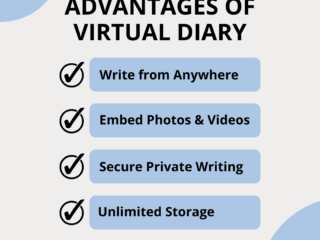
Diary writing is a wonderful way to reflect on your thoughts, feelings, and experiences. Whether you’re looking to process emotions, track progress towards a goal, or simply record daily happenings, a diary can be a valuable tool for self-reflection and self-discovery. When it comes to writing a diary entry, there are a few key elements to consider.
The format you choose will depend on your personal style and preferences, but typically, a diary entry will include a brief introduction, a detailed account of your experiences, reflections on those experiences, and a conclusion or takeaway message.
By taking the time to write down your thoughts and feelings, you can gain a deeper understanding of yourself and your world, and cultivate a sense of clarity, calm, and purpose in life.
Let’s see some of the example diary ideas or formats for diary writing that you can follow…
Diary Example Format #1
Date: (Insert date here)
Dear Diary,
(Begin your entry with a brief introduction or greeting. This can be as simple as “Today was a busy day” or “I can’t believe it’s already (insert day of the week)”.)
(Next, write about your day in detail. Describe what you did, who you talked to, and how you felt. You can also write about any significant events or moments that stood out to you.)
(After describing your day, you may want to reflect on your experiences. This is a chance to share your thoughts and feelings about what you experienced, and how you might want to approach similar situations in the future.)
(Finally, you can end your diary entry with a conclusion. This can be a summary of your day, a note about how you’re feeling now, or a goal or intention for tomorrow.)
Diary Example Format #2
Date: (Insert date here)
Title: (Optional, but you can use a title to summarize the main theme or event of your entry)
Body:
(Begin your entry with a brief introduction. This can be a sentence or two about your overall mood or state of mind.)
(Next, write about the events of your day in chronological order. You can include details such as where you went, who you talked to, what you ate, and any significant thoughts or emotions you experienced. Try to be as specific as possible, using sensory details to make the scene come alive.)
(After describing your day, reflect on your experiences. What did you learn, or what insights did you gain? How did your experiences make you feel, and why? This is also a good place to write about any goals or aspirations you have.)
(Finally, conclude your entry with a summary or closing thought. This can be a sentence or two that wraps up the main themes or emotions of your entry.)
Sincerely,
(Sign your name or use a pseudonym if you prefer)
Diary Example Format #3
Date: (Insert date here)
Location: (Optional, but you can include the location where you’re writing your entry)
Weather: (Optional, but you can include the weather conditions to set the scene)
Emotional State: (Optional, but you can write a brief note on your overall mood or emotions)
Body:
(Begin your entry with a sentence or two about what you’ve been up to recently or any significant events happening in your life)
(Next, write about your thoughts and feelings in response to these events. You can include any reflections, insights, or questions that come up for you.)
(After reflecting on your experiences, you may want to write about any challenges or obstacles you’re facing. This is an opportunity to be honest and vulnerable about your struggles, and to brainstorm possible solutions or coping strategies.)
(Finally, conclude your entry with a message of self-compassion and support. This can be a reminder to yourself that you’re doing the best you can or an affirmation of your resilience and strength.)
Diary Example Format #4
Date: (Insert date here)
Time: (Optional, but you can include the time you’re writing your entry)
Location: (Optional, but you can include the location where you’re writing your entry)
Mood: (Optional, but you can write a brief note on your overall mood or emotions)
Body:
(Begin your entry with a sentence or two about your day or any significant events happening in your life)
(Next, write about any thoughts, feelings, or experiences that stood out to you. You can include details about who you talked to, what you did, and any observations or insights you had.)
(After describing your experiences, you may want to reflect on what you’ve learned or what you’re grateful for. This is a chance to practice mindfulness and cultivate a sense of gratitude and appreciation.)
(Finally, conclude your entry with a message of self-care or intention for the future. This can be a reminder to take care of yourself, or a goal or aspiration for the coming days.)
Diary Example Format #5
Date: (Insert date here)
Time: (Optional, but you can include the time you’re writing your entry)
Location: (Optional, but you can include the location where you’re writing your entry)
Focus: (Optional, but you can write a brief note on the main focus of your entry)
Body:
(Begin your entry with a sentence or two about what’s been on your mind lately or any significant events happening in your life)
(Next, write about the main focus of your entry. This can be a particular emotion, situation, or challenge you’re facing, or a goal or aspiration you’re working towards.)
(After describing the main focus of your entry, you may want to reflect on your thoughts and feelings in response to it. This is a chance to explore your emotions, beliefs, and perceptions, and to gain insight into what’s driving your thoughts and actions.)
(Finally, conclude your entry with a message of encouragement or support. This can be a reminder to yourself that you’re doing the best you can or an affirmation of your worth and value.)
How It Benefits When You Follow a Diary Writing Format?
When you follow a diary format or template, it provides a structured and organized way to record your thoughts and experiences. Here’s a detailed explanation of how it helps –
- Gives Consistency – Using a diary format encourages you to write regularly. Having a set template or format can create a routine, making it easier to maintain the habit of journaling daily.
- Time Efficiency – With a predefined format, you don’t have to spend time deciding what to write about each day. The template prompts you to focus on specific aspects, streamlining the writing process.
- Comprehensive Records – A diary format often includes various sections, such as date, location, emotions, events, and reflections. This helps create comprehensive records of your life, capturing different dimensions of your experiences.
- Easy Retrieval of Info – When you have a consistent format, it becomes easier to locate specific entries later on. You can quickly find information about particular events or feelings by referring to the corresponding sections.
- Promotes Introspection – A diary format may include sections for self-reflection, prompting you to think deeply about your actions and emotions. This fosters introspection and self-awareness.
- Track Your Progress – Some diary formats include space for tracking progress on goals or habits. This allows you to monitor your development over time, providing motivation and accountability.
- Identify New Patterns – Using a template can reveal patterns in your thoughts, emotions, and behaviors. You might notice recurring themes or triggers that influence your experiences.
- Encourages Honesty – A structured format can make it easier to be honest with yourself. You may find it less intimidating to express your true feelings and thoughts when guided by specific prompts.
- Visualization of Your Growth – When you follow a diary template, you can visually see your growth and progress over time. This visualization can be empowering and inspire further self-improvement.
- Reduce Writer’s Block – Having a template can reduce writer’s block since it provides a starting point for your writing. You can simply follow the format and let your thoughts flow from there.
- Capture Important Details – The format may include sections to capture specific details, such as people you interacted with, places you visited, or notable occurrences. This helps preserve meaningful moments and memories.
- Enhances Your Focus – By following a structured diary format, you can concentrate on particular aspects of your life each day. This can prevent your writing from becoming too scattered or disorganized.
Using a diary format or template can be a valuable tool for effective journaling. It streamlines your writing process, facilitates introspection, and helps you create a meaningful and insightful record of your life. Remember that you can customize the format to suit your preferences and needs while still enjoying the benefits of a structured approach in life.
Final Thoughts
In conclusion, there are many different formats and styles of diary writing that you can choose from, depending on your personal preferences and needs – it’s purely a personal choice.
Whether you prefer a structured or free-form approach, you must focus on particular topics or themes, the most important thing is to find a format that works for you and stick with it. By developing a consistent diary writing practice, you can reap the many benefits of self-reflection, including greater self-awareness, clarity, and emotional regulation.
Having a well-formatted diary can make it easier to review your entries and track your progress over time esp when you rewind it back some other day. So, take your own time to experiment with different diary writing formats and find the one that feels most comfortable and effective for you.
The more you write and reflect, the more you will discover about yourself and your journey in life.





